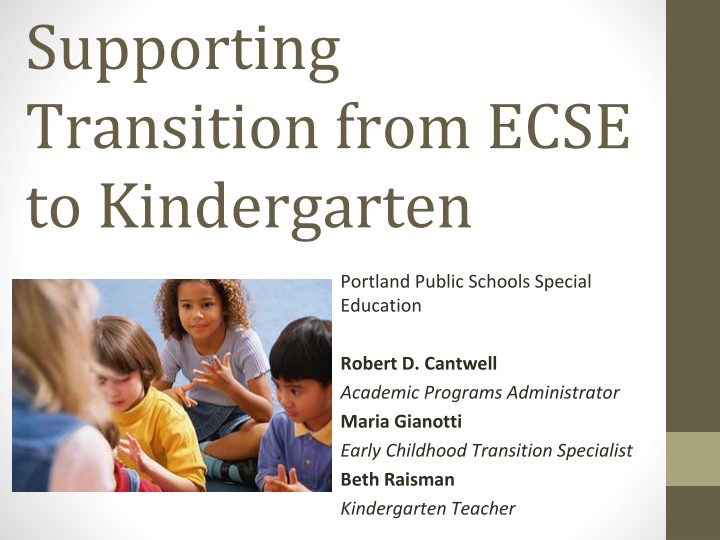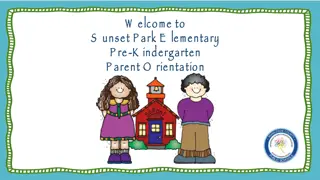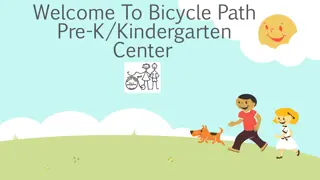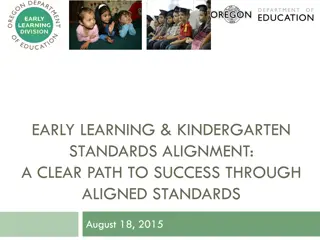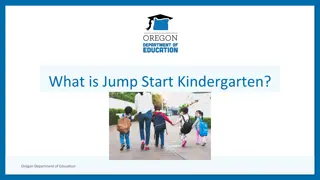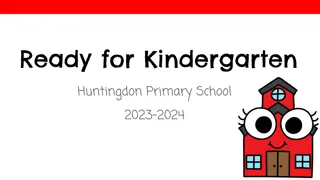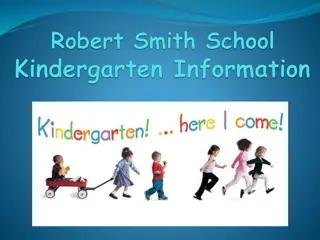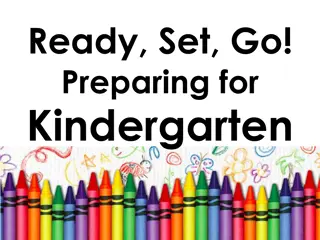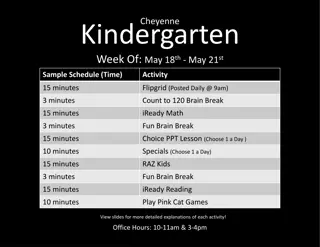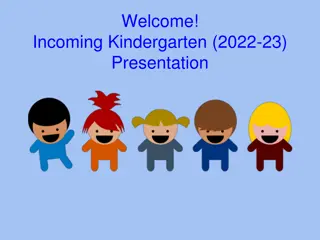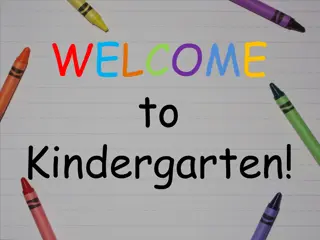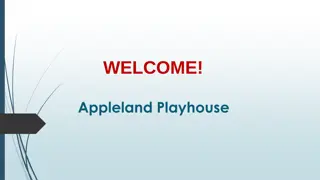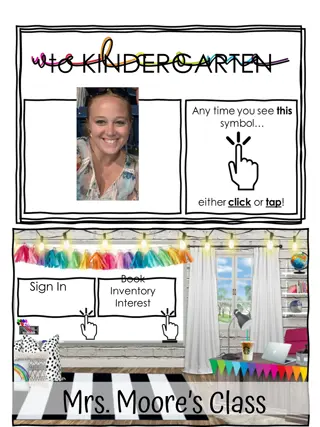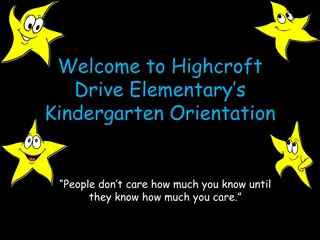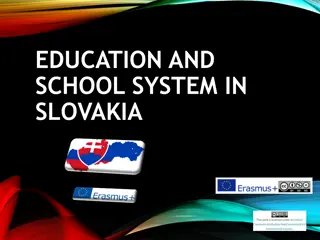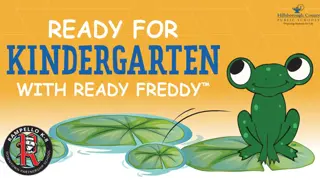Supporting Transition from ECSE to Kindergarten in Portland Public Schools
Portland Public Schools focuses on enhancing the transition process from Early Childhood Special Education (ECSE) to Kindergarten. Learn about the district overview, challenges, successes, family engagement strategies, stakeholder collaboration, required resources, and culturally responsive practices.
Download Presentation

Please find below an Image/Link to download the presentation.
The content on the website is provided AS IS for your information and personal use only. It may not be sold, licensed, or shared on other websites without obtaining consent from the author.If you encounter any issues during the download, it is possible that the publisher has removed the file from their server.
You are allowed to download the files provided on this website for personal or commercial use, subject to the condition that they are used lawfully. All files are the property of their respective owners.
The content on the website is provided AS IS for your information and personal use only. It may not be sold, licensed, or shared on other websites without obtaining consent from the author.
E N D
Presentation Transcript
Supporting Transition from ECSE to Kindergarten Portland Public Schools Special Education Robert D. Cantwell Academic Programs Administrator Maria Gianotti Early Childhood Transition Specialist Beth Raisman Kindergarten Teacher
Why are you here? Who s in the audience?
Learning Objectives for Today 1. Provide an overview of the PPS model and share the challenges and successes of this past year 2. Learn ideas for increasing and improving family engagement, i.e. Family Info sessions 3. Learn the importance of stakeholders (district early childhood staff, contracted ECSE providers, K teachers, building administrators, Special Ed administrators, families, etc.) working collaboratively to ensure a successful transition 4. Learn about resources needed to support K transition in this model 5. Learn strategies for ensuring the transition process is culturally responsive
District Overview Portland Public Schools, founded in 1851, is an urban school district in Portland, Oregon. With more than 48,500 students in 78 schools, it is the largest school district in the Pacific Northwest. At Portland Public Schools, this is our goal: By the end of elementary, middle and high school, every student by name will meet or exceed academic standards and will be fully prepared to make productive life decisions. PPS students also attend the Head Start Early Childhood Education program. Animate each bullet
PPS Facts and Figures Schools Elementary schools K-8 schools Middle schools High schools K-12 schools 28 29 10 10 1
Page 2 of the Fairfax handout As one HS mother shared with us, I don t think there is a very good transition of parents...it is a huge shock for parents who were in this warm, welcoming, all-encompassing coverage of a Head Start program...then you go to the public school system and it s like culture shock.
PPS Early Childhood Transition Team
Early Childhood Transition Team Provides children and families with an internal point of contact and support to ensure a successful transition from early childhood special education services to kindergarten. Provides additional support to K teachers and school teams.
Early Childhood Transition Team 8 Staff = 7.6 FTE 3 Teachers 3 Speech Language Pathologists 1 Occupational Therapist .6 School Psychologist Partial support and supervision from sped administrator as well as two classified staff; temporary one-day/week support from a classified records clerk
Background Not a brand new model Brought back in Fall 2014 to relieve workload issues Partnership with DDMECP; they provide services; we do all assessments for children residing in our district; we support K transition We supported 480+ transitioning children this year Transitioning children need to have a school age categorical eligibility; can t go with DD in Oregon 3D Process in PPS; way to frontload supports and fade over time
Successes Using a lens of cultural/linguistic diversity in our approach. Making a personal connection with families. Having one familiar face (transition coordinator) all through the process. Principals attending transition IEP meetings to meet families and learn about the students strengths and needs More kids starting in inclusive learning environments? Families visiting learning environment options that were being considered. Strengths-based and Person-Centered Approach. Sharing pictures of child at meeting. Having ECSE service providers at meetings. ANIMATE THESE
Successes (contd) Observations completed by transition coordinators Use Google Apps during meetings to take notes on children K tchrs appreciate the scheduling in advance; ECTT coordinated scheduling with parents IEPs were written by staff who have a knowledge of school-based services First-hand knowledge from in-district team member who had observed the child Balance out last two slides with equal number of bullets
Challenges Starting transition evals too late Sometimes families chooses other school options and the school team must still meet to complete transition IEP. Feels like lost time and energy. K has become more academic. The pressures of CCSS. Children s pre-K experience is critical. Within the early childhood context, social emotional readiness is K readiness. K Teachers report that 3-4 IEPs in one day makes for a long day; intense Some staff feel that CD has become a gateway to special education School teams still feel more adult support is better; 1:1s Capacity building of school staff; resource mapping Funding
Family Engagement Family Info Sessions How many and where Turnout What we learned; provide child care and food; decrease handout materials
Culturally Responsive Practices How we meet families where they re at. Home visits. Considering a family s cultural and linguistic background Asking families to define their cultural background
Role of Transition Coordinators Manages the Cycle Record Review as a team Evaluating all DD, expiring, or complex students Attend IFSP meetings to meet the family and get to know the student Permission to complete observations Meet with neighborhood school special ed team to block out days to discuss incoming Kinders Work with service provider to complete Early Childhood K checklist Gather info from family as part of IEP development Write IEP
The Cycle Fall: in classroom presence, visibility and support Coaching/Consultation START of NEW CYCLE Mid-October: Record Reviews of next year s group of children Invitations from MECP to IFSP meetings; typically our initial meeting of the family Nov/Dec: Start scheduling transition evaluations Before Spring Break: Schedule Transition IEP meetings with School Teams Completion of Transition IEP meetings through summer Fall: in classroom presence, visibility, and support
Collaboration with K Teachers Children who look complex on paper Student transitioning this fall has mobility issues; first time in 7 years this school has had a child with mobility issues CD+ kids; social emotional needs Connect teachers with resources, i.e. websites for pre-made visuals, etc. The value of dually endorsed teachers - Gen Ed/Sped
